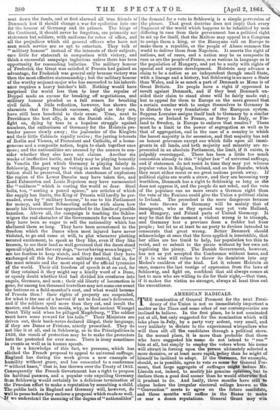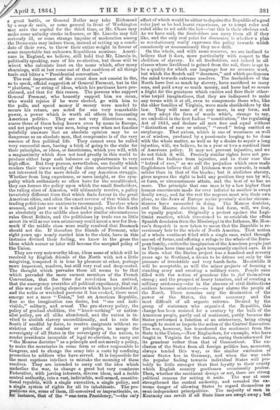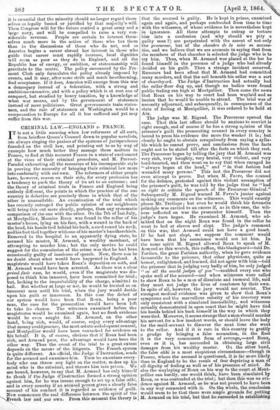AMERICAN RADICALS.
HE nomination of General Fremont for the next Presi- dency of the Union is not so immediately important a matter as the Times and some other of our contemporaries are inclined to believe. In the first place, he is not nominated yet at all, but only suggested for the nomination which will take place in July, by a party very ardent, very small, and very unlikely to dictate to the experienced wirepullers who- will then sift all the candidates through a political sieve. In the second place, it is more than probable that those who have suggested his name do not intend to "ran" him at all, but simply to employ the voters whom his name, will attract in forcing upon the person ultimately selected a more decisive, or at least more rapid, policy than he might of himself be inclined to adopt. If the Germans, for example,. should, as is possible, agree to vote en masse for General Fre- mont, that large aggregate of suffrages might induce Mr. Lincoln not, indeed, to modify his genuine opinions, but to. declare them a good deal sooner than he would otherwise feel it prudent to do. And lastly, three months have still to elapse before the irregular electoral college known as the "Convention" meets to agree on the future candidate, and three months will suffice in the States to make or mar a dozen reputations. General Grant may win a great battle, or General Butler may take Richmond by a coup de main, or some general in front of Washington may save the capital for the third time, or Mr. Chase may make some unlucky stroke in finance, or Mr. Lincoln may fall seriously ill, or some strange impulse of moderation among the Democrats may induce them, instead of setting up a candi- date of their own, to throw their entire weight in favour of some respectable but unknown Republican nominee. Ameri- cans in England, we believe, still hold that Mr. Lincoln is, politically speaking, sure of his re-election, but those will be wisest who calculate least on the name which, after many churnings, will at last come out of that cauldron of all things tonic and bitter a "Presidential convention."
The real importance of the event does not consist in the, so to speak, official suggestion of General Fremont, but in the "platform," or string of ideas, which his partisans have pro- claimed, and that for this reason. The persons who support General Fremont, who honestly support him we mean, who would rejoice if he were elected, go with him to the polls, and spend money if money were needed to secure his return, are noted for one very remarkable power, a power which is worth all others in forecasting American politics. They are not very illustrious men, scarce three of them being known even by name in Europe, and not perhaps very wise men, being even when not fanatics painfully unaware that an absolute opinion may be as dangerous as an absolute man, that compromise is of the very essence of free political life. They cannot even be called very successful men, having a trick of going to the stake for their principles, or ideas, or fanaticisms, which you will, with a magnanimity which does not tend greatly in this world to produce either large cash balances or appointinents to very high office. But they possess, nevertheless, one faculty which renders their views worthy of the close observation of men not interested in the mere details of any American struggle. Whether from long experience, or mere insight, or the sym- pathy which enthusiasts so often have for the uncultivated, they can foresee the policy upon which the small freeholders, the ruling class of America, will ultimately resolve, a policy invariably different from that which finds favour in the great American cities, and often the exact reverse of that which the trading politicians are anxious to recommend. The class when aroused, and just now it is wakeful to pain, rules the North as absolutely as the middle class under similar circumstances rules Great Britain, and the politicians by trade can as little arrest its will as our own aristocracy could arrest a war for Den- mark if the middle class were really resolved that Denmark should not die. If therefore the friends of Fremont, who eight years ago nearly carried him to the chair, have in this instance divined their feeling, we know in the gross the ideas which sooner or later will become the accepted policy of the Union.
They are very noteworthy ideas, ideas some of which will be received by English friends of the North with not a little misgiving, tempered it is true by pleasure at other, perhaps more important, resolves, but still very real and deep-seated. The thought which pervades them all seems to be that which pervaded the more earnest members of the French Convention, that the time for revolution has arrived, that the emergency overrides all political expediency, that out of this war and the jarring elements which have produced it, and the noble or wretched passions it has evoked, there must emerge not a mere "Union," but an American Republic, free as the imagination can desire, but "one and indi- visible," solitary, and armed. The pro-slavery policy, the policy of gradual abolition, the "know-nothing" or nation- alist policy, are all alike abandoned, and the nation is in- vited to abolish slavery unconditionally, and to rule the South if needful by force, to receive emigrants without re- striction either of number or privileges, to merge the sovereignty of all States in the sovereignty of the nation, to render presidents incapable of' legal re-election, to carry out "the Monroe doctrine " as a principle and not merely a policy, to make the secretaries in some form or other responsible to Congress, and to change the army into a caste by confining promotion to soldiers who have served. It is impossible for the most captious intellect to mistake the meaning of these resolves. They are intended to carry out the idea which underlies the war, to change a great but very cumbrous Federation, with jarring interests, diverse ideas, and a feeble central authority, into a vast, indivisible, well-armed, constitu- tional republic, with a single executive, a single policy, and a single system of rights for all its inhabitants. The pro- positions are, some of them, ill-conceived or impracticable, as, for instance, that of the "one-term Presidency,"—the only effect of which would be either to deprive the Republic of a good ruler just as he had learnt experience, or to tempt ruler and ruled alike to set aside the law—but this is their obvious end. As we have said, the freeholders can carry them all if they like, and the only real point for discussion is whether a plan so revolutionary really expresses the policy towards which consciously or unconsciously they now drift.
On the whole, and with some reserves, we are inclined to believe that it does, more particularly with respect to the abolition of slavery. In all freeholders, and indeed in all classes whose livelihood is gained from the soil, there is apt to be a quality for which our language has no accurate word, but which the Scotch call "dourness," and which predisposes the mind towards extreme resolves. The freeholders of the North have lost so much by slavery, have sacrificed so many sons, and paid away so much money, and have had so severe a fright for the greatness which excites and fires their other- wise torpid imaginations, that they are indisposed to make any terms with it at all, even to compensate those who, like the older families of Virginia, were made elaveholders by the law. They will none of it any more, in any form, and so they adopt the form of words which, strange to say, we embodied in the first Indian "constitution," the regulating Act of 1813, and declare all men free and equal without "distinction of race or colour," " creed " being omitted as surplusage. That axiom, which is one of weariness as well as of wisdom, produced by a passionate longing to be done with the whole matter, as well as by a desire to repair a long injustice, will, we believe, be in a year or two a cardinal item of American policy. It may not prevent injustice, and we do not think it will. Precisely similar rights have not pre- served the Indians from injustice, and in their case the "hatred of race," as we call the prejudice which once made Englishmen believe that all Irishmen were cowards, is much milder than in that of the blacks ; but it abolishes slavery, gives negroes the right to hold any position they can by wit, or force, or circumstances attain, and the best of us has no more. The principle that one man is by a law higher than human enactments made for ever inferior to another is swept finally away, and for the rest the negroes must win their own place, as the Jews of Europe under precisely similar circum- stances hayo succeeded in doing. The Monroe doctrine, and the Monroe doctrine in its bad form, will, we fear, be equally popular. Originally a protest against the Legi- timist reaction, which threatened to re-establish the effete Spanish dominion from the Mississippi to the Isthmus, Mr. Mon- roe's despatch is now taken to mean that the Republic is re- versionary heir to the whole of North America. That notion of a whole continent filled with a single race, ruled through one set of forms, and offering a refuge to the whole of the Euro- pean family, excites the imagination of the American people just as Utopias have time and again temporarily excited ours. It is- to them what the Darien project was a hundred and seventy years ago to Scotland, a dream to be driven out only by the pressure of irresistible and very harsh facts. Meanwhile it will be acceptable, as will the minor projects of forming a standing army and creating a military caste. People once filled with the notion of grandeur like to feel themselves strong ; and the prospect of heavy taxation, and of creating a military aristocracy—for in the absence of civil distinctions soldiers become aristocrats—no longer alarms the people of the North. There remains only the diminution of the power of the States, the most necessary and the most difficult of all organic reforms. Desired by the group of statesmen who organized the Republic, this change has been resisted for a century by the bulk of the American people, partly out of sentiment, partly because the States performed a function of an aristocracy, being strong enough to resist or impede the action of the Central Executive. The war, however, has transferred the sentiment from the State to the Union,—New Englanders, for example, who have fought in Virginia for the nation, caring thenceforward for its grandeur rather than that of Connecticut. The ex- clusion of the States from all foreign politics has, moreover, always tended this way, as the similar exclusion of minor States has in Germany, and when the war ends the popular feeling towards individual States will pro- bably be little stronger than that loyalty to their county which English country gentlemen occasionally profess. Then, whether the sentiment decays or not, there are strong political reasons for setting it aside. The war at once strengthened the central authority, and revealed the ex- treme danger of allowing States to regard. themselves as semi-independent principalities. The majority of men in Kentucky can revolt if all State hues are swept away ; but




































 Previous page
Previous page